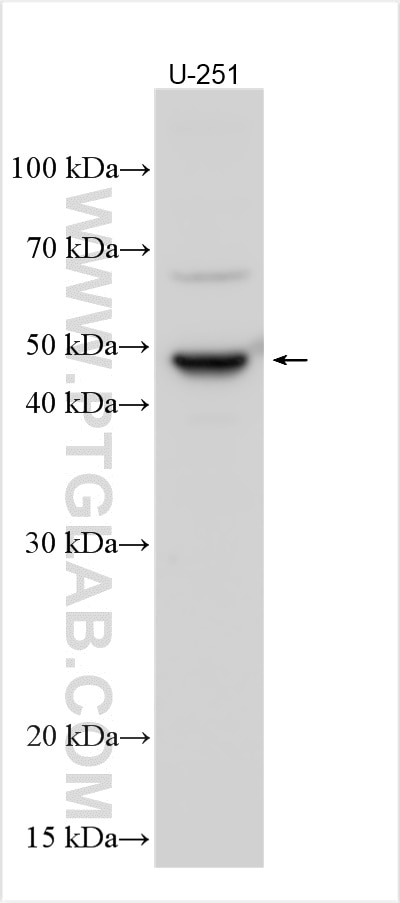KERA Polyklonaler Antikörper
KERA Polyklonal Antikörper für WB, ELISA
Wirt / Isotyp
Kaninchen / IgG
Getestete Reaktivität
human
Anwendung
WB, ELISA
Konjugation
Unkonjugiert
Kat-Nr. : 13728-1-AP
Synonyme
Geprüfte Anwendungen
| Erfolgreiche Detektion in WB | U-251-Zellen |
Empfohlene Verdünnung
| Anwendung | Verdünnung |
|---|---|
| Western Blot (WB) | WB : 1:500-1:1000 |
| It is recommended that this reagent should be titrated in each testing system to obtain optimal results. | |
| Sample-dependent, check data in validation data gallery | |
Produktinformation
13728-1-AP bindet in WB, ELISA KERA und zeigt Reaktivität mit human
| Getestete Reaktivität | human |
| Wirt / Isotyp | Kaninchen / IgG |
| Klonalität | Polyklonal |
| Typ | Antikörper |
| Immunogen | KERA fusion protein Ag4689 |
| Vollständiger Name | keratocan |
| Berechnetes Molekulargewicht | 352 aa, 41 kDa |
| Beobachtetes Molekulargewicht | 40-50 kDa |
| GenBank-Zugangsnummer | BC032667 |
| Gene symbol | KERA |
| Gene ID (NCBI) | 11081 |
| Konjugation | Unkonjugiert |
| Form | Liquid |
| Reinigungsmethode | Antigen-Affinitätsreinigung |
| Lagerungspuffer | PBS with 0.02% sodium azide and 50% glycerol |
| Lagerungsbedingungen | Bei -20°C lagern. Nach dem Versand ein Jahr lang stabil Aliquotieren ist bei -20oC Lagerung nicht notwendig. 20ul Größen enthalten 0,1% BSA. |
Hintergrundinformationen
Keratocan and Lumican are the predominant class II SLRPs(Small leucine-rich proteoglycans) in the corneal stroma. While not totally corneal-specific together these SLRPs are excellent biomarkers for the tissue. Mutant mice deficient for keratocan expression have transparent but thin corneal stromas with a mild increase in collagen fibril diameter with no further abnormalities.In humans, mutations in the keratocan gene are associated with a flattened cornea in a rare condition known as cornea plana. The relative specificity of keratocan to corneal keratocytes has been useful for tissue-specific targeting for genetic manipulation of the corneal stroma.(PMID: 32663498)
Protokolle
| PRODUKTSPEZIFISCHE PROTOKOLLE | |
|---|---|
| WB protocol for KERA antibody 13728-1-AP | Protokoll herunterladen |
| STANDARD-PROTOKOLLE | |
|---|---|
| Klicken Sie hier, um unsere Standardprotokolle anzuzeigen |


